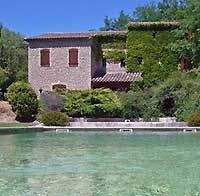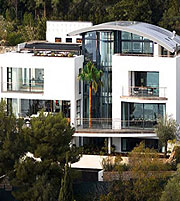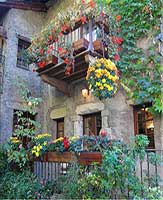Tax on property income in France
Effective Tax Rate on Rental Income |
|||
| Monthly Income | €1,500 | €6,000 | €12,000 |
| Tax Rate | 10.00% | 8.15% | 8.78% |
| Click here to see a worked example | |||
Source:
 Disclaimer
Disclaimer
|
|||
INDIVIDUAL TAXATION
French taxation is ruled by the massive Code Général des Impots (CGI), which is available at Legifrance. A shorter write-up is available at Impots (Tax).
Nonresidents are taxed on their French-sourced income. Married couples may be taxed jointly or separately.
INCOME TAX
For rentals, the net income received by a nonresident is subject to a minimum income tax rate of 20%, unless the taxpayer can prove that, if he had been resident in France, his effective rates of taxation (on his worldwide income) would have been lower than 20% (which is unlikely). This rate applies to both furnished and unfurnished rentals.
The decision whether to let furnished or unfurnished is important, because it has implications (a) for taxation, primarily as to deductions allowed, and (b) for the tenant's rights vis-à-vis the landlord.
Rule: Choose 'unfurnished' if there are high deductible expenses, such as high mortgage expenses. Otherwise, choose 'furnished', assuming the local 'professional' taxes are not too high.

Furnished property, which includes bed and beakfasts and gites (self-catering holiday cottages), is taxed under the business profits heading of income tax (but not as corporate income). If the gross furnished rental income is less that €80,000 per annum, a flat 71% can be deducted to cover all expenses and claimable deductions (which simplifies book-keeping) and the balance (i.e., 29%) will be taxed at the prevailing rate i.e., taxed at 20% of income, i.e., gross rental income is taxed at 5.80%.
There is then the issue of whether one is taxed as a 'professional' or 'non-professional' landlord. Some areas of France levy the 'professional' tax, which is similar to English business rates, on landlords of furnished premises, using the Land Registry property values. It can be expensive.

Unfurnished lettings are taxed under income tax as 'real property income'. In arriving at net rental income, deductions can include repairs, maintenance and improvements (excluding construction), local taxes, employee costs, mortgage interest expenses, management fees and insurance costs. If revenues are less than €32,000, a 50% fixed deduction is applied.
Tax losses can be set against all personal income up to €10,700. Note that if interest on a loan to finance the purchase is claimed as a tax-loss, that can only be deducted over ten years.
Important: Foreigners resident for tax purposes in countries with which France has no double taxation treaty are assessed for French rental income tax on a notional income basis (revenu forfataire) equal to three times the notional rental value of the homes available to them in France, according to Article 164C of the French tax code (this applies whether or not they actually derive any income from the properties in France).
[Such foreigners will need to consider structuring themselves as a 'property investment partnership (société civile immobilière or SCI)', a company not subject to French corporate tax - similar to an English partnership. If it has a registered address in France, the shareholders or partners, whether or not French resident, will be taxed according to their shares as French residents (no tax agent is needed). But any lettings under such a CGI will be taxable as a company.
Rentals which meet the specification of various tax-incentive schemes can avail of special deductions (a profession of special advisors has grown up around this subject, called 'défiscalisation').
Popular tax incentive schemes include:
The "Dispositif Robien" concerns new or rehabilitated buildings.
- Depreciation expenses can be deducted from letting revenues at 6% per annum for the first 7 years, and 4% per annum for the 2 subsequent years. In all, 50% of all expenses can be amortized.
- Remodelling expenses can be amortized
The dwelling must be rented unfurnished, for a period of at least nine years, to a renter who uses it as his principal dwelling, and for a rent which is below a certain ceiling:
- €21.02 per square meter in Zone A (Paris, Code D'Azur, French Genevois)
- €14.61 per square meter in Zone B1
- €11.95 per square meter in Zone B2
- €8.76 per square meter in Zone C
There are limits on the maximum rental income which can enjoy these benefits, which vary by area and size of taxable household.
Other similar schemes for new buildings include the Loi Demessine, Loi Girardin, Loi Malraux, Monuments Historiques, Déficit Foncier, LMP-LMNP
Payment of income tax
Nonresidents must file the nonresident's tax return between late April and late June; the due date depends on the country of residence.
Centre des impôts des non-résidents
Address: 14, rue du Centre TSA 10010 - 93465 NOISY LE GRAND Cedex.
Main switchboard: 01 57 33 83 00, or 33 1 57 33 83 00
E-mail: [email protected]
PARTNERSHIP ROUTE
A property investment partnership (société civile immobilière, or SCI) is a legal form designed for the acquisition or construction of buildings (houses, flats or entire buildings), to be rented to third parties or provided free of charge to the partners. It allows French inheritance law to be by-passed. However, if furnished property held through an SCI is rented out, it loses its tax transparency, and is taxed like a company.
An SCI must consist of at least two partners. A written contract, known as the by-laws, is required of every SCI. The partners are liable for the SCI's debts in proportion to their share in its capital. SCIs are burdensome, as they require the registration of the SCI, and the keeping of annual accounts in French, based on French accounting practitice and tax code. Non-submission of the SCI annual accounts may result in a penalty of 3% of the market value of the property.
CAPITAL GAINS TAX
Capital gains are generally taxed at 19%. Taxable capital gains are calculated by deducting acquisition and improvement costs from the selling price or property value at the time of the sale.
The capital gains tax is levied at 33.33% for non-EU citizens, and 50% for residents of non-cooperating countries.
Capital gains tax is not levied on the taxpayer's principal residence. For investment properties, capital gains tax is not levied after 30 years of ownership.
PROPERTY TAX

Property Taxes
There are two types of property taxes in France, the taxe d'habitation and the taxe foncière. Whoever actually resides in a building is obliged to pay the tax d'habitation. Generally, rental leases also provide that the tenant will reimburse the landlord for the taxe foncière, which is otherwise payable by the owner of the property. The tax foncière is a combination of tax for the building (taxe foncière bâtie) and for the land (taxe foncière non bâtie).
CORPORATE TAXATION
INCOME TAX
Corporate tax applies automatically to sociétés anonymes, sociétés par action simplifiées, sociétés a responsabilité limitée, sociétés en commandite par actions, and some co-operatives. Corporation tax may also apply to other bodies, such as sociétés civiles, and even to sociétés de personnes (partnerships), according to the nature of their business.
The corporate tax rate is currently 33.33%. Income-generating expenses are deductible when calculating taxable income.
For small-to-medium enterprises (SME) with €7,630,000 turnover, at least 75% owned by individuals, and with profits of less that €38,120, the corporation tax on profits is 15%. The first €38,120 of taxable income is taxed at 15% and taxable income exceeding the threshold amount is taxed at 33.33%.
Surtax
A surcharge of 3.3% applies to the standard corporate income tax liability if the amount exceeds €7,630,000, which results in the overall effective corporate tax rate of 34.43%.